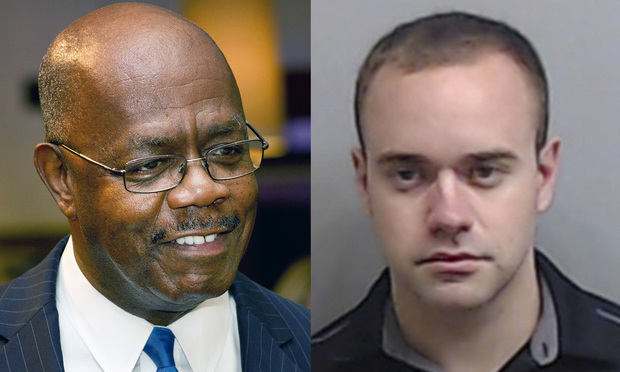In Prosecuting Police, Atlanta DA Has Contradictory Stance on Taser's Deadliness, Defense Says
A Fulton County Superior Court judge on Tuesday set a $500,000 bond for former Atlanta police officer Garrett Rolfe.
June 30, 2020 at 06:39 PM
5 minute read
 Fulton County District Attorney Paul Howard and Rolfe Garrett, one of the two police officers charged in the Rayshard Brooks shooting death.
Fulton County District Attorney Paul Howard and Rolfe Garrett, one of the two police officers charged in the Rayshard Brooks shooting death.
Defense lawyers who secured a $500,000 bond Tuesday for the fired Atlanta police officer who fatally shot Rayshard Brooks said the shooting was justified based on an earlier determination by District Attorney Paul Howard that a taser is a deadly weapon.
The defense also criticized Howard during Tuesday's hearing for previously making two stunning allegations when announcing felony charges against officers Garrett Rolfe and Devin Bronson at June 17 news conference. Rolfe attorney Noah Pines said his client never kicked Brooks as he lay dying on the pavement and never uttered the phrase, "I got him," after shooting Brooks twice in the back, as Howard claimed.
Fulton County Superior Court Judge Jane Barwick set bond on Rolfe, who faces charges including felony murder, aggravated assault, criminal damage to property, violating his oath of office, and failing to render medical aid. Prosecutors contend that while both officers did render medical aid to Brooks, they waited about two minutes before doing so.
At the DA's request, Rolfe has been held without bond since the charges were filed.
Brosnan, who is free on a $50,000 signature bond, also faces multiple felony charges, including aggravated assault, violating his oath of office, and failure to render medical aid.
But the legal debate at the heart of the charges against the two officers over whether or not the deadly shooting was justified that surfaced at Rolfe's bond hearing also highlight contradictory positions that Howard has taken on whether a taser is a deadly weapon in pursuing felony charges against a total of eight Atlanta police officers since George Floyd was asphyxiated by Minneapolis police in May.
Pines cited a felony warrant that Howard's investigator obtained against one of six police officers currently facing aggravated assault and other felony charges in a case that sprang from demonstrations in Atlanta following Floyd's death.
Howard filed multiple felonies against the officers after two college students—Messiah Young and Taniyah Pilgrim—were tasered and dragged from their car during demonstrations in downtown Atlanta on May 30 as police sought to enforce a curfew. Young also suffered a broken wrist and a gash that required stitches, and both students were handcuffed for hours in a police van while being denied protective masks. The warrant justified the felony charges in those cases by describing the taser as a deadly weapon.
But in announcing charges against Rolfe and Brosnan, Howard said the taser Brooks took from Brosnan was inoperative because it had already been fired twice and so posed no threat to the officers.
Executive Assistant DA Clint Rucker fought throughout the hearing to prevent Rolfe's release, calling the late-night shooting that began as a report of a man passed out in his car in a fast-food drive-thru "excessive" and "unnecessary."
Rucker said Brooks was not an immediate threat to Rolfe because he was running away, and that the shooting was unjustified—an argument he sought to use to question Rolfe's good character and whether he could be trusted not to flee if free on bond.
But Pines said Brooks was shot after he committed multiple felonies as he fought the officers after Rolfe attempted to handcuff him for being too intoxicated to drive. Brooks punched Rolfe in the face, knocked Brosnan to the pavement so hard he suffered a concussion, wrested away Brosnan's taser and tasered the officer, then fired the taser at Rolfe as he ran, Pines said. Brooks was shot just after turning and firing the taser at Rolfe in what Pines contended was an aggravated assault.
In a brief filed with the court prior to the bond hearing, Pines argued that Rolfe was justified in using deadly force if he reasonably believed that Brooks possessed a deadly weapon. And, he added, Howard's office has already determined in bringing felony aggravated assault charges against six other Atlanta police that a taser fits that description and that firing it is an assault.
Rolfe's bond also included a number of conditions, among them a requirement that Rolfe wear an ankle monitor, abide by a curfew and not have contact with any Atlanta police. But Barwick rejected one unorthodox request from by Rucker that as a condition of bond, Rolfe be forced to provide prosecutors with the passcode to his cell phone, which prosecutors have so far been unable to unlock.
Barwick agreed with Pines and co-counsel Lance LoRusso that prosecutors' search and seizure of evidence was a matter for another hearing and that ordering him to surrender his passcode in order to secure a bond would violate his rights.
This content has been archived. It is available through our partners, LexisNexis® and Bloomberg Law.
To view this content, please continue to their sites.
Not a Lexis Subscriber?
Subscribe Now
Not a Bloomberg Law Subscriber?
Subscribe Now
NOT FOR REPRINT
© 2025 ALM Global, LLC, All Rights Reserved. Request academic re-use from www.copyright.com. All other uses, submit a request to [email protected]. For more information visit Asset & Logo Licensing.
You Might Like
View All
A Plan Is Brewing to Limit Big-Dollar Suits in Georgia—and Lawyers Have Mixed Feelings
10 minute read
On The Move: Kilpatrick Adds West Coast IP Pro, Partners In Six Cities Join Nelson Mullins, Freeman Mathis
6 minute read

Did Ahmaud Arbery's Killers Get Help From Glynn County DA? Jury Hears Clashing Accounts
Trending Stories
- 1Gunderson Dettmer Opens Atlanta Office With 3 Partners From Morris Manning
- 2Decision of the Day: Court Holds Accident with Post Driver Was 'Bizarre Occurrence,' Dismisses Action Brought Under Labor Law §240
- 3Judge Recommends Disbarment for Attorney Who Plotted to Hack Judge's Email, Phone
- 4Two Wilkinson Stekloff Associates Among Victims of DC Plane Crash
- 5Two More Victims Alleged in New Sean Combs Sex Trafficking Indictment
Who Got The Work
J. Brugh Lower of Gibbons has entered an appearance for industrial equipment supplier Devco Corporation in a pending trademark infringement lawsuit. The suit, accusing the defendant of selling knock-off Graco products, was filed Dec. 18 in New Jersey District Court by Rivkin Radler on behalf of Graco Inc. and Graco Minnesota. The case, assigned to U.S. District Judge Zahid N. Quraishi, is 3:24-cv-11294, Graco Inc. et al v. Devco Corporation.
Who Got The Work
Rebecca Maller-Stein and Kent A. Yalowitz of Arnold & Porter Kaye Scholer have entered their appearances for Hanaco Venture Capital and its executives, Lior Prosor and David Frankel, in a pending securities lawsuit. The action, filed on Dec. 24 in New York Southern District Court by Zell, Aron & Co. on behalf of Goldeneye Advisors, accuses the defendants of negligently and fraudulently managing the plaintiff's $1 million investment. The case, assigned to U.S. District Judge Vernon S. Broderick, is 1:24-cv-09918, Goldeneye Advisors, LLC v. Hanaco Venture Capital, Ltd. et al.
Who Got The Work
Attorneys from A&O Shearman has stepped in as defense counsel for Toronto-Dominion Bank and other defendants in a pending securities class action. The suit, filed Dec. 11 in New York Southern District Court by Bleichmar Fonti & Auld, accuses the defendants of concealing the bank's 'pervasive' deficiencies in regards to its compliance with the Bank Secrecy Act and the quality of its anti-money laundering controls. The case, assigned to U.S. District Judge Arun Subramanian, is 1:24-cv-09445, Gonzalez v. The Toronto-Dominion Bank et al.
Who Got The Work
Crown Castle International, a Pennsylvania company providing shared communications infrastructure, has turned to Luke D. Wolf of Gordon Rees Scully Mansukhani to fend off a pending breach-of-contract lawsuit. The court action, filed Nov. 25 in Michigan Eastern District Court by Hooper Hathaway PC on behalf of The Town Residences LLC, accuses Crown Castle of failing to transfer approximately $30,000 in utility payments from T-Mobile in breach of a roof-top lease and assignment agreement. The case, assigned to U.S. District Judge Susan K. Declercq, is 2:24-cv-13131, The Town Residences LLC v. T-Mobile US, Inc. et al.
Who Got The Work
Wilfred P. Coronato and Daniel M. Schwartz of McCarter & English have stepped in as defense counsel to Electrolux Home Products Inc. in a pending product liability lawsuit. The court action, filed Nov. 26 in New York Eastern District Court by Poulos Lopiccolo PC and Nagel Rice LLP on behalf of David Stern, alleges that the defendant's refrigerators’ drawers and shelving repeatedly break and fall apart within months after purchase. The case, assigned to U.S. District Judge Joan M. Azrack, is 2:24-cv-08204, Stern v. Electrolux Home Products, Inc.
Featured Firms
Law Offices of Gary Martin Hays & Associates, P.C.
(470) 294-1674
Law Offices of Mark E. Salomone
(857) 444-6468
Smith & Hassler
(713) 739-1250






